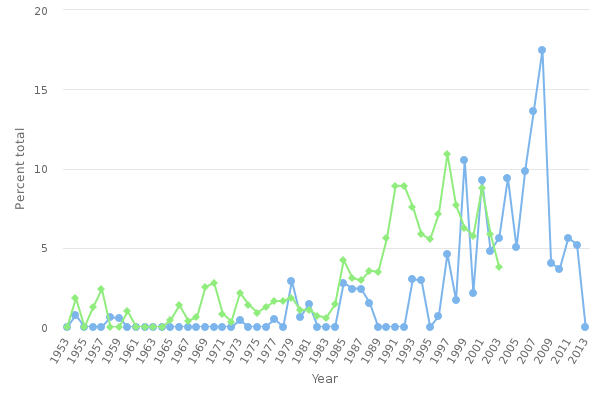Datasets
In Denmark, the political season does not follow the calendar year. The parliament is in session from the first Wednesday of October until the start of July. Political activities in parliament therefore follow the parliamentary year more than the calendar year. Each activity is coded with regard to the parliamentary year in which the activity took place. In addition to the id-number of the parliamentary year (starting from 0 in 1953), a calendar year is also provided for each activity, and it refers to the year in which the parliamentary year starts. Hence, this year can easily be different from the actual date in which the activity took place – which is also provided in the data set (named “date_of_activity”). This is the case if the activity took place in the second half of the parliamentary year.
In order to adhere to the political cycle, we advise researchers to use the parliamentary year as the unit of analysis.
Please also notice that some of the secondary variables may not be coded for the data after 2006.
Due to GDPR-legislation, we do not upload any names on who asks a question.
In addition to codebooks, the Danish project has some data reports. One covers all parliamentary activities (bills, interpellations, questions, accounts, motions) with an update to include details related to the post 2003-2004 updates and the Master CAP codebook, one covers PM speeches and party manifestos, and one that covers the media. For the most recent data update, please see this report.
For an introduction to the Danish Agenda-Setting Data Set please see the chapter by Green-Pedersen and Mortensen in the book: Comparative Policy Agendas: Theory, Tools, Data, Frank R. Baumgartner, Christian Breunig, and Emiliano Grossman, eds. Oxford University Press, 2019.
A codebook for the old Danish content codes (for older data) can be found here.
download master topics codebook
Explore Policy Trends

Click to explore policy trends with Denmark pre-selected.
The Trends tool allows for policy comparisons across governing institutions and countries.
The Danish dataset contains the content of all parliamentary activities in the Danish parliament: accounts, bills, interpellations, motions, question hour, the opening speech of the Prime Minister, the closing speech of the Prime Minister, and party manifestos. The dataset extends back to 1953, where an amendment to the constitution changed the Danish political system. The dataset has recently been updated to 2017.
A content coding of the media agenda (1984-2003) is also part of the data set. However, this dataset was coded according to a more aggregated version of the policy agenda setting coding scheme. The coding system used can be cross-walked to the other datasets at the main topic level.
The project was founded in 2003 by Christoffer Green-Pedersen and has received funding from the Danish Social Science Research Council and the Research Foundation at Aarhus University. Recently, a new project by Peter Bjerre Mortensen (PI) has been launched on “The Causes and Consequences of Comparative Agenda Setting” (CAPCAS), that collects agendas from the councils as wells as committees of all 98 Danish municipalities 2007-2017. This project investigates why societal problems gain or lose attention on the political agenda and how this agenda-setting process matters for policy decisions.
When using the data, please add the following citation ”The data in the Danish Policy Agenda Project have been collected by Christoffer Green-Pedersen and Peter Bjerre Mortensen with support from the Danish Social Science Research Council and the Research Foundation at Aarhus University".
Principal Investigator: Christoffer Green-Pedersen (cgp@ps.au.dk) and Peter Bjerre Mortensen (peter@ps.au.dk)
Location: Department of Political Science, Aarhus University, Denmark
Email: cgp@ps.au.dk
Downloadable Data Series: 10
Time Span: 1953-2016
Total Observations: 220,612
Sponsoring Institutions
The project was founded in 2003 by Christoffer Green-Pedersen and has received funding from the Danish Social Science Research Council and the Research Foundation at Aarhus University.
Denmark
Featured Research:
The Power of the Loser
 Seeberg, Henrik Bech (2022). ‘The Power of the Loser: Evidence on an Agenda-Setting Model of Opposition Policy Influence’, European Journal of Political Research.
Read more
Seeberg, Henrik Bech (2022). ‘The Power of the Loser: Evidence on an Agenda-Setting Model of Opposition Policy Influence’, European Journal of Political Research.
Read more














